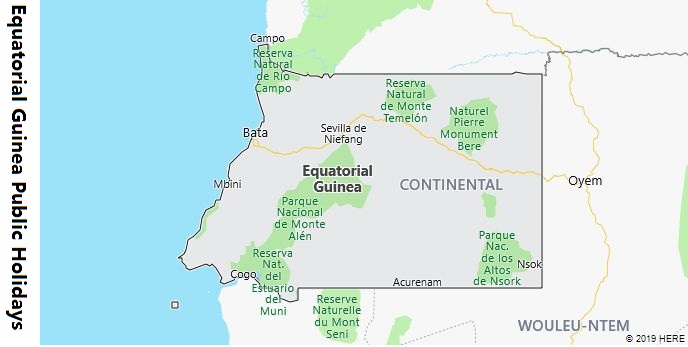Equatorial Guinea Public Holidays
Equatorial Guinea Public Holidays
Searching for the national holidays in Equatorial Guinea? All public holidays in Equatorial Guinea are treated like Sundays. This means that most of the Equatorial Guinea employees have a day off and all schools are closed on these office holidays. If you are planning a trip to Equatorial Guinea and want to know what the national and regional holidays are, check the details in the tables below.
Equatorial Guinea, located on the west coast of Central Africa, has a rich history influenced by its indigenous cultures, Spanish colonial rule, and its modern political landscape. The public holidays in Equatorial Guinea reflect the nation’s diverse cultural, religious, and political heritage, offering a mix of traditional, Christian, and national holidays. The country, which has a predominantly Roman Catholic population, celebrates several religious holidays that are observed with great reverence, as well as national holidays commemorating its independence and political milestones. These holidays are a time for both reflection and celebration, with festivals, parades, and family gatherings that bring the nation together.
National Holidays in Equatorial Guinea
1. New Year’s Day (Día de Año Nuevo) – January 1
Date: January 1
Description: New Year’s Day marks the first day of the year and is a celebration of the start of a new calendar year. In Equatorial Guinea, it is a public holiday where people celebrate with family gatherings, festive meals, and social activities. The day is marked by joy and reflection, and many people attend church services to begin the year with blessings and prayers. Most businesses, government offices, and schools are closed for the day, making it a time for rest and relaxation.
Observance: Nationally
Days Off: 1
2. Labour Day (Día del Trabajador) – May 1
Date: May 1
Description: Labour Day is a holiday that honors the contributions of workers to the country’s economy and society. It is observed globally, and in Equatorial Guinea, the day is marked with rallies, marches, and speeches that advocate for workers’ rights and social justice. In cities such as Malabo, trade unions and workers’ groups often hold demonstrations and organize events to call for better working conditions. Labour Day is an important time for reflecting on the progress of labor movements and the importance of workers in building the nation.
Observance: Nationally
Days Off: 1
3. Independence Day (Día de la Independencia) – October 12
Date: October 12
Description: Independence Day in Equatorial Guinea commemorates the country’s independence from Spain, which was gained on October 12, 1968. This day is one of the most important holidays in the country, marked by national pride, celebrations, and ceremonies. Independence Day is celebrated with military parades, speeches from government officials, and cultural performances that highlight the country’s achievements and its sovereignty. The holiday is a reflection of the sacrifices made during the struggle for independence and is celebrated with patriotic fervor across the country.
Observance: Nationally
Days Off: 1
4. Constitution Day (Día de la Constitución) – November 15
Date: November 15
Description: Constitution Day celebrates the day when the current constitution of Equatorial Guinea was promulgated in 1991. The constitution serves as the legal foundation of the country’s government, outlining the framework of the nation’s political system. This day is marked with government ceremonies, including speeches and discussions on the importance of the constitution in maintaining law and order. Although the holiday is not as widely celebrated as Independence Day, it is significant in reminding the citizens of the importance of their political and legal rights.
Observance: Nationally
Days Off: 1
5. Christmas Day (Navidad) – December 25
Date: December 25
Description: Christmas Day is a widely celebrated holiday in Equatorial Guinea, with religious and cultural observances marking the birth of Jesus Christ. It is a time for family gatherings, festive meals, and attending church services. Christmas traditions include decorating homes with lights and ornaments, singing carols, and sharing meals with family and friends. The holiday also brings the nation together in celebration and reflection on the values of peace, goodwill, and charity. As with other public holidays, most businesses, government offices, and schools are closed.
Observance: Nationally
Days Off: 1
6. New Year’s Eve (Nochevieja) – December 31
Date: December 31
Description: New Year’s Eve marks the final day of the year, and in Equatorial Guinea, it is celebrated with social gatherings, parties, and fireworks. The night is filled with celebrations as people gather to welcome the new year. Traditionally, families and friends come together to share a meal and offer prayers for good fortune in the year to come. This is a time for reflecting on the past year, celebrating accomplishments, and looking forward to new opportunities. Most businesses and schools close early for the holiday.
Observance: Nationally
Days Off: 1
Religious Holidays in Equatorial Guinea
1. Holy Week (Semana Santa) – Varies (March/April)
Date: Varies (March/April)
Description: Holy Week is one of the most significant religious observances in Equatorial Guinea, as the country is predominantly Catholic. The week begins with Palm Sunday, leading up to Good Friday, Holy Saturday, and Easter Sunday. The celebration is marked by church services, processions, and religious observances that commemorate the passion, death, and resurrection of Jesus Christ. In towns and cities across the country, churches hold processions where people carry religious icons and sing hymns. Good Friday and Easter Sunday are especially significant and are observed with public holidays.
Observance: Nationally
Days Off: 2 (Good Friday and Easter Sunday)
2. Ascension of Christ (Ascensión de Cristo) – Varies (May/June)
Date: Varies (May/June)
Description: The Ascension of Christ celebrates the event in Christian belief when Jesus ascended to heaven. It is observed on the 40th day of Easter, and in Equatorial Guinea, it is marked by Mass and religious ceremonies. Many people attend church services to celebrate this event, and it is a day of reflection on Christ’s final days on Earth. Ascension Day is a public holiday, and many businesses and government offices are closed for the observance.
Observance: Nationally
Days Off: 1
3. Feast of the Assumption of Mary (Asunción de la Virgen María) – August 15
Date: August 15
Description: The Feast of the Assumption of Mary celebrates the belief that the Virgin Mary was taken into heaven. In Equatorial Guinea, this is an important religious holiday marked by Mass and church services across the country. Many people participate in processions and special prayers, reflecting on Mary’s role in Christianity. The holiday is a public holiday, and most businesses and government offices are closed.
Observance: Nationally
Days Off: 1
4. All Saints’ Day (Día de Todos los Santos) – November 1
Date: November 1
Description: All Saints’ Day is a Catholic holiday that honors all saints, both known and unknown. In Equatorial Guinea, this day is marked by attending Mass, visiting cemeteries to honor deceased loved ones, and offering prayers. It is a solemn occasion where many people reflect on the lives of saints and martyrs, as well as the memories of their family members. It is an official public holiday, and most businesses, government offices, and schools are closed.
Observance: Nationally
Days Off: 1
Other National and Cultural Holidays in Equatorial Guinea
1. National Day of the Armed Forces (Día de las Fuerzas Armadas) – August 3
Date: August 3
Description: National Day of the Armed Forces honors the men and women in uniform who defend the sovereignty and security of Equatorial Guinea. The day is marked by military parades, ceremonies, and speeches from political and military leaders. The holiday emphasizes the importance of the armed forces in maintaining peace and order in the country. It is celebrated with pride, and it serves as a reminder of the country’s military achievements.
Observance: Nationally
Days Off: 1
2. National Day of Youth (Día Nacional de la Juventud) – February 12
Date: February 12
Description: National Day of Youth is a celebration that focuses on the youth of Equatorial Guinea and their role in the development of the country. The holiday is a time for young people to reflect on their contributions to society and their potential in shaping the future. On this day, various activities are organized to celebrate youth culture, education, and opportunities for growth. Although not a public holiday, it is widely observed, with various social, cultural, and educational events taking place.
Observance: Nationally
Days Off: Not a public holiday, but widely celebrated
3. Teacher’s Day (Día del Maestro) – December 8
Date: December 8
Description: Teacher’s Day is a national holiday that recognizes the contributions of educators in Equatorial Guinea. It is a time to honor teachers for their dedication to education and their role in shaping the country’s future. Schools and universities often celebrate with ceremonies, performances, and expressions of gratitude to teachers. While this is not a nationwide public holiday that results in business closures, it is widely observed by educational institutions.
Observance: Nationally
Days Off: Not a public holiday, but widely observed
Public Holidays Observance and Work Schedule
The following table shows the public holidays, the number of days off, and which groups of people observe the holidays.
| Holiday | Date | Days Off | Groups Observing |
|---|---|---|---|
| New Year’s Day (Día de Año Nuevo) | January 1 | 1 | Nationally |
| Labour Day (Día del Trabajador) | May 1 | 1 | Nationally |
| Independence Day (Día de la Independencia) | October 12 | 1 | Nationally |
| Constitution Day (Día de la Constitución) | November 15 | 1 | Nationally |
| Christmas Day (Navidad) | December 25 | 1 | Nationally |
| New Year’s Eve (Nochevieja) | December 31 | 1 | Nationally |
| Holy Week (Semana Santa) | Varies (March/April) | 2 | Nationally, Catholic communities |
| Ascension of Christ (Ascensión de Cristo) | Varies (May/June) | 1 | Nationally, Catholic communities |
| Feast of the Assumption of Mary (Asunción de la Virgen María) | August 15 | 1 | Nationally, Catholic communities |
| All Saints’ Day (Día de Todos los Santos) | November 1 | 1 | Nationally, Catholic communities |
| National Day of the Armed Forces (Día de las Fuerzas Armadas) | August 3 | 1 | Nationally |
| National Day of Youth (Día Nacional de la Juventud) | February 12 | Not official, widely celebrated | Nationally |
| Teacher’s Day (Día del Maestro) | December 8 | Not official, widely celebrated | Nationally |















































